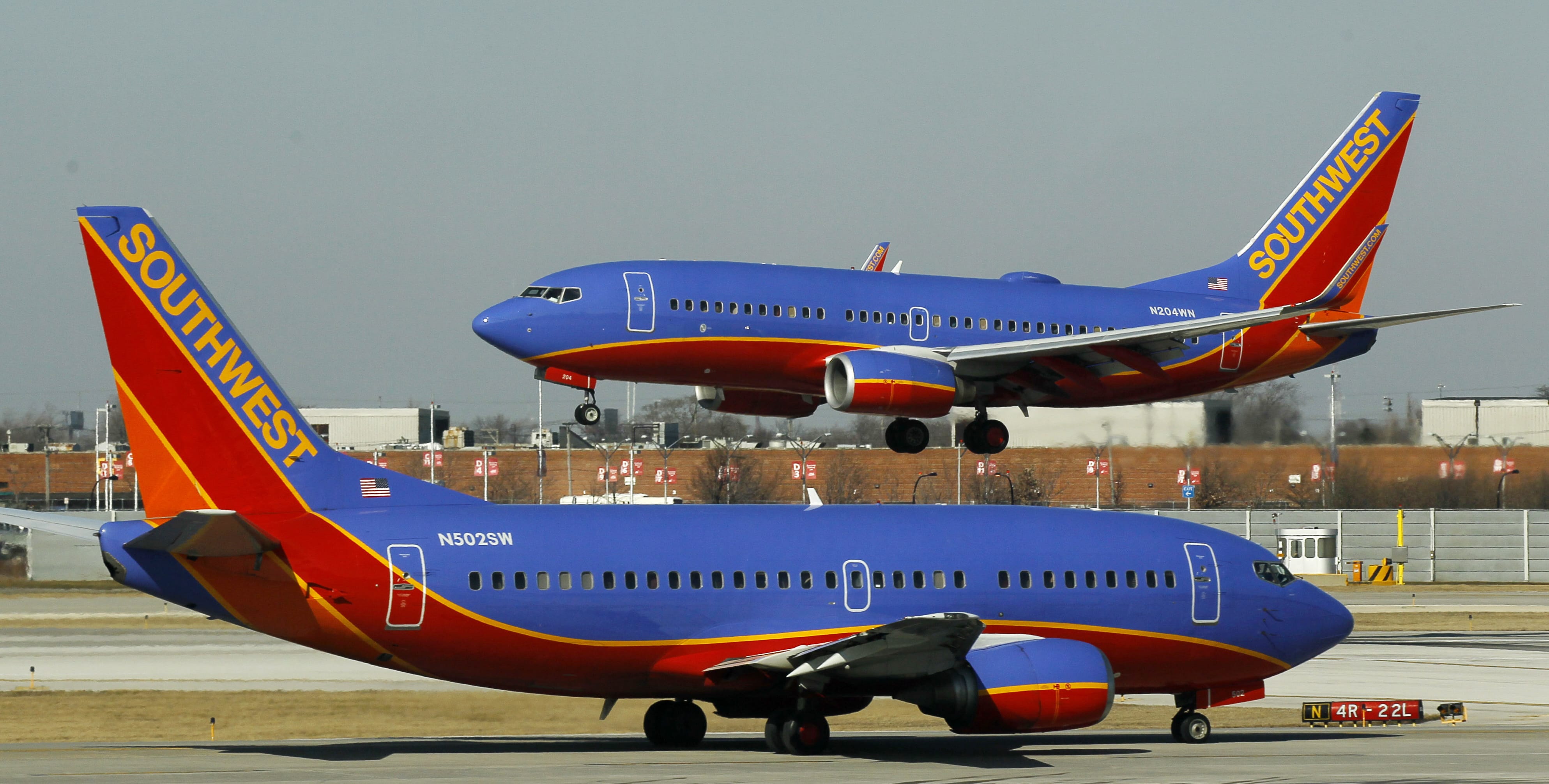Southwest Airlines’ reputation as an industry maverick seems to be going the way of flight attendants in hot pants and $20 one-way fares.
The nation’s largest domestic carrier just marked its 40th straight profitable year, an unmatched feat in a time of economic turbulence, fluctuating fuel prices and airline bankruptcies. It did so by undercutting the competition with no-frills flights and, in the process, building an army of budget-minded fans.
Now many of those longtime customers say the Dallas-based carrier that calls itself LUV Airlines has been losing their love since it recently began to shift its focus away from low fares and friendly service toward swelling its bottom line.
Among the changes that critics say show Southwest’s new profit-boosting attitude: It cut the legroom on many planes to fit more seats, retooled its frequent flier program to make passengers spend more money to collect points and adopted new fees to board early.
“Southwest used to be a great airline,” said Lance Malkind, a semi-retired consulting actuary from Phoenix who has been flying Southwest for 33 years. “The fares were reasonable, onboard service was excellent, and the frequent flier plan was simple and very good. Now the fares are no longer that good compared to other airlines, and the frequent flier plan has gone from being one of the best to one of the worst.”
Southwest is still the country’s only major airline to waive fees for the first two checked bags. It also ranks high in on-time performance. But even airline officials conceded that Southwest had to find new ways to make money to compete.
“Yes, we have to keep up with the times, and yes, we have to change,” said Whitney Eichinger, a spokeswoman for the airline. “But the truth is that Southwest remains a maverick in the industry.”
Many of the new fees adopted in the past couple of years are for optional services, such as early boarding and wireless Internet access, she said. But what has long been included in the price of the fare — two checked bags, snacks and drinks — remains free, Eichinger added.
“If we were charging for peanuts, that is something that our customers would find outrageous,” she said.
Because Southwest has forgone millions of dollars in revenue from baggage fees, analysts say, it was no surprise that the airline would look for other ways to generate extra cash to offset rising labor and fuel costs.
“Southwest is in the middle between customers who are very sensitive to higher fares and investors, on the other hand, complaining that the airline is not doing enough,” said Seth Kaplan, a managing partner at Airlines Weekly, a trade publication.
With the economy rebounding and demand for air travel still relatively strong, airline industry experts say now is the best time for Southwest to test new moneymaking ideas without risking the loss of too many loyal fans.
“I’m not surprised by this,” said Betsy Snyder, an analyst with Standard & Poor’s. “They want to increase their profits, and this is the way to do it. They could lose passengers, but in some markets, what’s the option? Do other airlines offer anything better?”
Southwest was born in 1971, serving Dallas, Houston and San Antonio with three Boeing 737s — a plane that still represents nearly 90 percent of its fleet. It made its headquarters at Dallas’ Love Field, which later earned it the stock symbol LUV.
The airline took to the air amid tough competition from now-defunct Braniff and Texas International and fought back by offering free bottles of liquor and half-price fares for overnight flights.
Almost from the beginning, Southwest has pushed its niche — low fares but no extra frills like seat assignments, in-flight meals or roomy first-class seats. The hot-pants uniforms worn by flight attendants in the 1970s were replaced with shorts and pants in the ’80s.
Southwest enjoyed its best years in the late 1990s, when it saved millions of dollars with fuel hedging contracts that enabled the airline to buy fuel at a fixed price to avoid the exposure of price fluctuations. But the hedging advantage ended around 2008 when fuel prices dropped.
As the Great Recession took hold, most other airlines added baggage fees to boost revenue. Southwest, instead, broke from the trend and adopted a “bags fly free” policy. JetBlue is the only other airline to waive fees for the first checked bag, but it doesn’t for the second.
Southwest officials said the bags-fly-free policy is probably responsible for increasing Southwest’s market share about 2 percent since 2008 and generates up to $1 billion annually.
To further expand its customer base, Southwest announced a $1.4 billion deal in 2010 to acquire Orlando, Fla.-based AirTran Airways.
Still, under pressure to increase profits, Southwest adopted several changes in the past two years that have angered some passengers.
In 2011, Southwest retooled its frequent flier program to award points based on fares paid instead of total flights.
To squeeze six extra seats onto each plane, Southwest announced last year a new cabin design for most of its planes that will include seats with thinner cushions, less recline and reduced legroom. Eichinger said that despite the reduction in space, the seats are lighter and more comfortable.
This year, the airline increased fees to check a third bag or an overweight or oversized bag and added a fee to board early. It also plans to enforce a new fee this year for passengers who miss a flight without first calling to cancel. The fee amount has yet to be announced.
Although Southwest has reported profits for 40 straight years, the margin has been dropping, to 2.44 percent in 2012 from 4.54 percent in 2010, according to Robert Herbst, a consultant and founder of AirlineFinancials.com.
The latest policy change to dishearten fans was an optional $40 fee to be among the first 15 passengers seated — a fee that Tammy Romo, Southwest’s chief financial officer, said could generate “tens of millions” of dollars.



